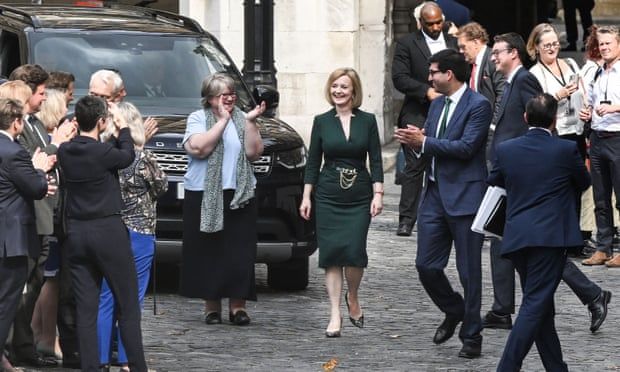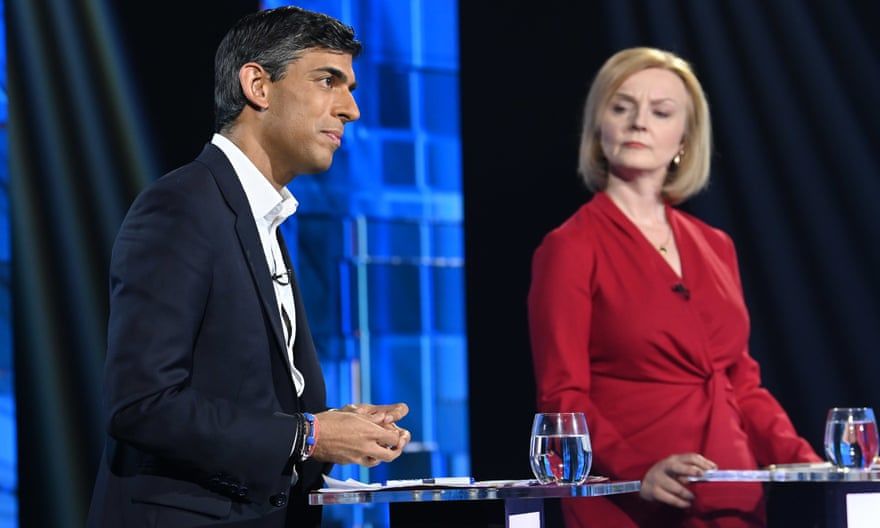
On the brink: how Liz Truss rose to claim the Conservative crown
When it all began, more than seven weeks ago, with Liz Truss declaring at her campaign launch that she would “be ready to be prime minister from day one”, it didn’t look remotely likely that such an arrival in No 10 would ever come to pass.
The “Liz for leader” launch was amateurish and chaotic, and did not bode well. Truss was introduced by the business secretary, Kwasi Kwarteng, but for an excruciating minute she failed to appear. Ready to serve, perhaps, but not quite ready to explain why she should.
When she did turn up, Truss, the foreign secretary, stumbled over her words, at one point mentioning “Putin’s appalling war in Ru … Ukraine”. Afterwards, she couldn’t find her way out of the room, and headed straight for a window.
Truss’s early wrong turns contrasted – and coincided – with a surge of support for the initially more assured Penny Mordaunt. While Rishi Sunak topped the ballot of Tory MPs at every stage, the ex-defence secretary appeared, during her brief moment in the sun, to be the more likely heir to Margaret Thatcher than Truss.
Wrapping herself in the union jack at her PM4PM launch the day before Truss’s event, Mordaunt had stirred Tory emotions, recalling having watched the Falklands fleet sail out off Portsmouth as a young girl. The image, and her long-held support for Brexit, helped power her for a short period into second place behind Sunak in the MPs’ ballot.
For Truss, in the early days while the contest was focused in Westminster it all seemed an unequal struggle. She was criticised for lacking polish and appeal, and for sounding wooden. Backing Remain in 2016 and being a member of the Lib Dems in her student days were not attributes on her CV that were going to help. Nor were parliamentary colleagues flocking to her. In the first round of voting, she had only received 50 backers in a parliamentary party of 357 members – just 10 more than junior minister Kemi Badenoch, who was attracting far more positive headlines.
But Mordaunt mania was to prove short-lived, and Badenoch would run out of steam. Mordaunt had described Boris Johnson’s premiership as a “failed model”, which did not go down well with some MPs on the right of the party. Residual loyalty to, and striking levels of Tory nostalgia for, Johnson would play a big part throughout the campaign among MPs and party members alike, helping Truss at every turn.
It was, however, Mordaunt’s views on transgender issues which really popped her campaign bubble, sunk her hopes and revived Truss. In a sustained barrage over several days, the Tory press tore into Mordaunt for her “woke” views in the not too distant past and suggested her attempts to downplay them were disingenuous and unbefitting of a future prime minister. Deals were struck on the right between MPs who had backed former attorney general Suella Braverman and camp Truss.
Playing the role of the continuity candidate who had remained loyal to Johnson, Truss overtook Mordaunt in the last, decisive MPs’ vote to make the final two with Sunak. Six weeks of hustings across the UK were to follow, with the 150,000 or so Tory members making the final choice.
Tomorrow at 12.30pm Truss will almost certainly cap an extraordinary comeback, and a striking campaigning success among the Tory membership, when she is announced as the clear winner and next leader of the party.
 Kemi Badenoch after announcing she would run for leader; she attracted positive headlines.
Kemi Badenoch after announcing she would run for leader; she attracted positive headlines.
Then on Tuesday, barring a huge upset that would make a mockery of several polls of members that put her far ahead, she will fly to Balmoral to meet the Queen and return as prime minister, before appointing her cabinet and government.
The results of the three previous Tory leadership campaigns have been fairly easy to explain.
In 2005 David Cameron was the confident young Tory moderniser, the Conservatives’ answer to Tony Blair, while David Davis too much represented the old guard. In 2015 Theresa May won without a vote of members when Andrea Leadsom pulled out. Then in 2019 Boris Johnson was the obvious darling of the party who had led the country to Brexit and promised to get it done, thrashing Jeremy Hunt, the less charismatic but steadier ex-health secretary, Remainer and technocrat.
With Truss’s victory, the historians will have a tougher job. She made the final runoff with the support of just 32% of Tory MPs, to Sunak’s 38%. Johnson had had 51% at the same stage in 2019. On the evening that Truss narrowly beat Mordaunt to secure her place in the last two with Sunak, several Tory MPs were in open despair at the prospect of a Truss premiership. One said that it was “like 1995 if we had elected John Redwood”.
Neither does she seem very popular with 2019 Tory voters – a far wider group than the members, admittedly, but with plenty of overlap andclearly vital to the party’s chances of winning again. In our Opinium poll this weekend just 21% of 2019 Tory voters say she looks like a prime minister in waiting (down nine points since 3 August) against 27% who say Sunak does (down three points).
So how has Truss pulled it off – assuming that she has – and persuaded Tory members that she is the one?
The former Tory MP and minister Paul Goodman, who now edits ConservativeHome, sums it up in one word: “adaptability”. “She is the former Remainer who is now the darling of Leavers. She is the former Lib Dem who is now the hero of the Tory right and she is the new kid on the block having been in the cabinet for eight years.”
Another ex-Tory minister and MP notes: “Liz is a very canny operator with very sharp political instincts that people often don’t always recognise. She has spent a lot of time with people in the party, the ones who are voting.”
It is that experience that has helped her to judge exactly how to pitch her appeal to the very particular interests of the Tory “selectorate” – a group well to the right of Conservative supporters at large.
Part of her adaptability, her supporters say, involved finding simple ways to turn her apparent weaknesses into strengths – playing the honesty and loyalty cards for all they were worth. From the start, she also made a virtue of her cheap £4.50 earrings, noting the contrast with Sunak’s £450 Prada shoes.
 Supporters applaud Liz Truss outside parliament.
Supporters applaud Liz Truss outside parliament.
Luke Tryl, a former Tory special adviser and now director of More in Common, an organisation that has conducted regular focus groups on the candidates, said people warmed to Truss’s apparent straightforwardness – her ordinariness as a person and politician. They were qualities that had more appeal in the country than in the Westminster bubble.
“What a lot of commentators saw as Liz’s weaknesses, she turned into strengths. People repeatedly said they liked the fact that she was straight-talking and ‘actually answered the question’. They liked her talking about coming from a comprehensive school in Leeds. I know people in SW1 are sick of hearing it, but obviously most of the public only hear it that one time.
“When she said ‘I’m not the slickest candidate’, people liked that because it sounded honest and humble. What’s most apparent from the focus groups is that people aren’t, in 2022, looking for a Blair 2.0, but someone who ‘gets it’ during a cost of living crisis, and they were more convinced that she did get it. In contrast, what made Sunak so appealing to lots of commentators was what made a lot of the public think he was just too polished, and they didn’t like how he approached Liz in the debates. When he asked her which she regretted more – being a Lib Dem or voting Remain – people thought it was cheap.”
By contrast, Sunak’s recent history – revelations about his extreme wealth and tax affairs, and his decision to resign over Boris Johnson’s failures of leadership – jarred, and added to the impression that Truss was somehow more in tune with the values of party members.
MPs report that Truss’s loyalty to Johnson was key in deciding members’ views. “A big part of this is that a very large part of the membership – and a good chunk of MPs as well – were just completely opposed to Rishi,” said a senior MP.
“He was, in their eyes, the man who stabbed Boris in the back. When I’m talking to members, people have so little actual enthusiasm for her. It’s all been ‘it can’t be Rishi’.”
Even her supporters say that Truss has been fortunate with the timing of the contest. “If Rishi had been able to have a go at the leadership towards the end of last year [before stories about his tax affairs emerged], he would have walked it,” said a former cabinet minister. “Things have developed since then. We’ve had the cost of living crisis and a lot of people felt that Rishi wasn’t actually providing answers. If anything, he was far too slick. I think people thought this man maybe lacks authenticity. And then there were a few slip-ups, such as the reference to his daughters eating a McDonald’s breakfast wrap which hadn’t been on sale for two years. Then there was his wealth, which I didn’t see as an issue, but members did. It was also evident he was absolutely gagging for the premiership. There was a feeling he needed taking down a peg or two.”
Some Sunak backers believe there has been an element of latent racism, though they can’t prove it. “There are still some around who think that we need a white man or white woman,” said one. Another MP said: “There is a feeling of having to have someone like us, among the members. It is there but it is very largely subconscious.”
Truss projected herself more as the optimistic candidate. She offered hope in contrast to Sunak’s grim assessment of the economy.
While Truss put tax cuts at the heart of her campaign, a core Thatcherite message, Sunak insisted that now was not the time – that such an approach in the current climate was “fairytale” economics that would fuel inflation, and was even “immoral”. An ex-minister who resigned over Johnson’s leadership and then backed Sunak said it was in fact Sunak who had been the straightforward and honest one, but he had paid for it.
“What I think he didn’t get maybe was that people like fairytales … they love it when you offer them loads of stuff and do not say how they are going have to pay for it.”
Truss had repositioned herself on Brexit – in a way that was sneered at by many in Westminster, even many Leavers – as the woman who had delivered numerous post-Brexit trade deals, despite the fact that most of them were rolled over agreements from when the UK was in the EU. “This kind of thing worked among our people. It made sense of Brexit to them,” another Sunak-supporting MP said. “They could say she had done the deals. It all allowed the Daily Express to call her the Brexit superwoman.”
Rob Ford, professor of politics at Manchester University, believes Truss succeeded by aligning herself more closely than Sunak with the interests and instincts of the rightwing Tory membership.
“At the start of the leadership contest, my gut instinct was that whichever candidate emerged from the MPs’ multiple ballots as the standard bearer of the right would immediately be favourite to win with the membership. Liz Truss ended up being that candidate, and she has been strong favourite from the moment the member-focused campaign began.”
This and her loyalty to Johnson, were key, said Ford. “A substantial – probably decisive – portion of the Conservative membership never broke faith with Johnson. The decision not to quit has given Truss a decisive advantage in a contest with Rishi Sunak, who was the most senior figure to resign from Johnson’s government. Winning back Boris fans was always going to be an uphill struggle for Sunak, whose early departure and scathing criticism did much to trigger his downfall. All Truss has had to do is appear more loyal to her predecessor than his backstabber-in-chief.”
The Tory peer Robert Haywood said nostalgia for Johnson grew in the weeks after he was ousted, and Truss benefited: “As the campaign progressed, there developed a strong group of Boris loyalists for whom Liz became the person around whom to coalesce, since Rishi was perceived as part of the Ides of March/backstabber brigade.”
 Rishi Sunak and Liz Truss during their debate on ITV; she knows how to turn her weaknesses into strengths.
Rishi Sunak and Liz Truss during their debate on ITV; she knows how to turn her weaknesses into strengths.
Once she enters No 10, a new set of daunting challenges will present themselves to Truss, chief among them the cost of living crisis, for which there is no parallel in recent history. Key decisions will be needed on the levels of economic support that can be afforded. The economy is teetering on the brink of a deep recession and inflation is racing upwards, raising questions about whether the tax cuts she promised are really the way to go.
Truss’s support in Westminster is dangerously small and quite unstable. Those on the right of the party who backed her will want to see her deliver tax cuts and promises to take a hard line on the Northern Ireland protocol.
The fact that she has won the crown with the support of Johnson allies – as well as the man himself – also sets her on a collision course with the current prime minister’s supporters should she displease him in any of her early decisions. “The moment she betrays them, she’ll suddenly be a Remainer again,” said one MP. Another said her closeness to Johnson allies and figures on the right fringes of the party would see her make the “exact same mistake” as May – handing positions to people who will storm out and trigger a crisis.
So febrile and fragile is her support, say some, that there are already rumours of when and how letters of no confidence could be submitted. Talk among MPs turns quite swiftly to whether or not she will make it to an election – an extraordinary starting point before she has even started in office. Others believe that traditional Tory party discipline, particularly potent as an election approaches, will kick in.
“It’s not very stable, particularly if you spent the entire summer basically telling the right of the party what they want to hear,” said one MP. “I fully expect that her first act as prime minister is going to be to U-turn on all of that and announce a massive support package, including handouts she said she was against.”










